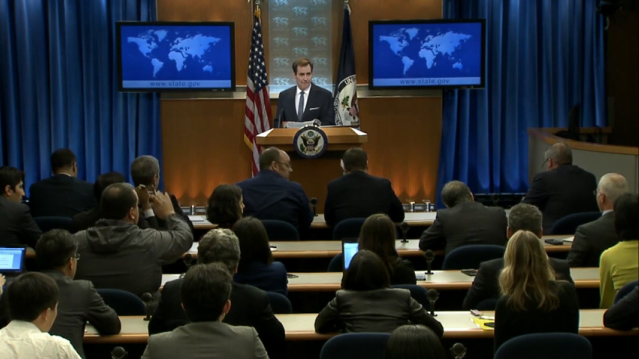 Official statements are often made from the podium
Official statements are often made from the podium
What Constitutes Credibility in US Public Diplomacy
As discussion ensues over how to combat ISIS online or counter Russian propaganda, it’s worth taking a look at the elements that lend to credible messaging. The importance of credibility cannot be underestimated, as it provides the initial basis by which members of a target audience decide to listen to one’s message in the first place.
Whether it is the United States or “local voices” engaging in messaging, understanding how these actors are perceived is crucial when determining the proper course for communication.
Below are some factors which contribute positively or negatively to credibility:
Matching Action to Words
A credible actor follows through on its words. It does not make promises it can’t keep, and commits deeds and action to its rhetoric. Statements from the podium may matter for state-to-state relations, but if they are to be felt by the people of a country, a clear connection between word and deed must be drawn.
ISIS’ credibility online is certainly related to its ability to carry out action. When ISIS threatens to do something in its online videos, it is known to follow through with its threats. This has been key when attacking or taking over cities and carrying out acts of intimidation. Though ISIS’ tactics are revolting, and US government efforts have criticized ISIS’ hypocrisy, the threats combined with brutality have given ISIS a reputation lends to its violent objectives.
This is not to say that the United States should openly engage in threat-making, but rather that it should do what it says it will do. If it is not in a position to follow through on its commitments, it should avoid making statements suggesting it will.
Being Truthful
Truth is crucial to credibility. Being truthful, even when the facts do not look favorably upon you, can be vital for maintaining your credibility at a future time when it truly matters.
Voluntary truth, even when it is not beneficial, builds rapport and generates trust. It provides the benefit of the doubt in times when misinformation abounds.
Attempts to obscure or hide the truth must be analyzed heavily. If policy makers see a reason to do this, a serious analysis must be made to determine why the US is undertaking actions in the first place which may reflect poorly on its stated goals and ideals. The US should strive to avoid actions which routinely appear unfavorable.
This is not to say that the US government is not entitled to secrets, especially as it pertains to the conduct of diplomacy, the military, and various other aspects of national security. But in the internet age, willful deception is quickly uncovered, and generally unwise.
Official Status
The United States Government, speaking on official behalf of itself, lends a great deal of credibility. No one is a better conveyer of US foreign policy than itself. Statements coming from the U.S. Government or representatives thereof can carry significant weight.
But this official status also comes with some drawbacks. It limits the type of dynamic and flexible messaging that non-state actors often enjoy. An audience that is hostile to a state will automatically discount its messaging. Official statements require clearances, are slow, and without action to back them up may not be worth the time it took to get the clearances.
Guilt by Association
Lending US support to an otherwise credible movement can destroy that movement’s credibility. It can open that group or individual to criticism or accusations as being a “puppet” of the so called “great satan.”
Keeping this in mind, a target audience that is “on the fence” about radicalization or opinion of the United States is unlikely to see the US as a credible messenger. Those seen as supported or funded by the US do not retain the credibility that is afforded by independence of thought.
Considering this, the US must be incredibly cautious when promoting or essentially coopting homegrown movements. For many of these movements or narratives to retain their credibility and ultimately benefit the foreign policy objectives of the US, they must not be seen as being under American influence.
Audience Perception
When it comes to credibility, audience perception matters. Self-perception is irrelevant.
To disillusioned youth, the United States is not a credible messenger. To someone susceptible to ISIS’s messaging, the US is not a credible messenger.
Considering this, understanding an audience’s perceptions matters. Is the audience already friendly to the United States? Is the audience on the fence? Or is it adversarial? These initial perceptions serve inform an appropriate approach vector, and determine whether or not messaging coming from the United States is viewed as trustworthy.
So the real question remains: Is the message best when it comes from America? From a friend? From family? Or from a truly independent subject matter expert? The answer to this question will be a major factor in determining an appropriate public diplomacy strategy.






Well done. The USG, in particular, tends to overrate its own credibility. Sometimes, using proxies is more effective.